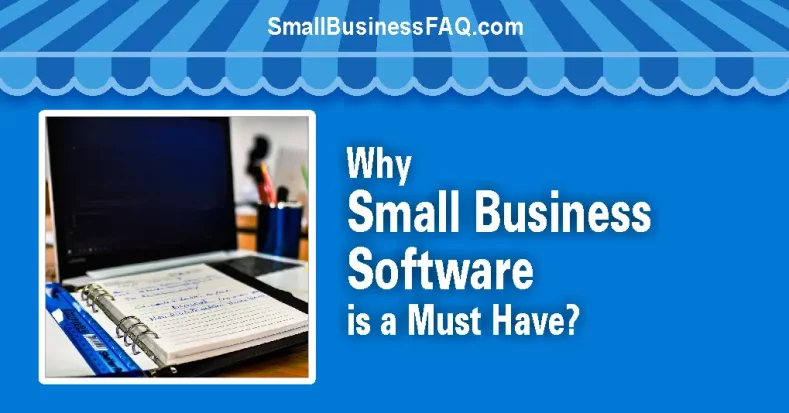Importance of Small Business Softwares
In the modern business world, small businesses form the backbone of economies around the world. They bring innovation, employment opportunities, and a unique flavor to various industries. To thrive in this competitive environment, small businesses must embrace technology, and one crucial aspect of this is adopting small business software. This article delves into the world of small business software, explaining what it is, why it’s essential, and what specific software tools are indispensable for small business success.
What is Small Business Software?
Small business software refers to a wide range of digital tools and applications specifically designed to streamline and enhance various aspects of running a small business. These software solutions are tailored to the needs and constraints of small-scale enterprises, helping them manage operations more efficiently, make informed decisions, and improve overall productivity.
Why do Small Businesses Need Software?
- 1. Efficiency and Productivity: Small businesses often operate with limited resources, including staff. The software can automate repetitive tasks, freeing up valuable time and human resources for more critical activities.
- 2. Improved Decision-Making: Software provides small businesses with data-driven insights, helping them make informed decisions based on accurate information rather than guesswork.
- 3. Enhanced Customer Service: CRM (Customer Relationship Management) software allows businesses to manage customer relationships effectively, resulting in improved customer satisfaction and loyalty.
- 4. Cost Savings: Many software solutions are cost-effective and can help small businesses reduce overhead expenses, such as hiring additional staff.
- 5. Competitive Advantage: In a competitive market, small businesses can gain an edge by adopting software that enhances their operations, making them more agile and responsive to market changes.
Why is Software Important in Small Business?
The importance of software in small businesses cannot be overstated for several reasons:
- 1. Efficiency: Software automates routine tasks, reducing the risk of errors and enabling businesses to do more with fewer resources.
- 2. Scalability: As businesses grow, software can adapt and scale to accommodate increased demands, ensuring continuity and flexibility.
- 3. Data Management: Software helps small businesses collect, store, and analyze data, facilitating better decision-making and strategic planning.
- 4. Competitive Edge: Software tools give small businesses access to tools and capabilities that were once reserved for larger enterprises, leveling the playing field.
What Software is Used for Small Business?
Small businesses use various types of software tailored to their specific needs, including:
- 1. Accounting Software: Tools like QuickBooks and Xero help manage finances, track expenses, and generate financial reports.
- 2. Customer Relationship Management (CRM) Software: Salesforce, HubSpot, and Zoho CRM are popular choices for managing customer relationships and sales pipelines.
- 3. Project Management Software: Asana, Trello, and Basecamp assist in organizing and tracking projects and tasks.
- 4. Marketing Software: Email marketing platforms like Mailchimp and social media management tools like Hootsuite help with marketing efforts.
- 5. Point of Sale (POS) Software: Square and Shopify provide solutions for processing sales in-store and online.
What is the Simplest Bookkeeping Software?
For small businesses looking for user-friendly bookkeeping software, QuickBooks and Xero are often recommended choices. Both platforms offer intuitive interfaces and robust features for managing financial transactions, invoicing, and expense tracking.
Which Software is Most Used in Business?
The choice of software can vary based on the industry and business needs, but some widely used software in small businesses include Microsoft Office Suite (Word, Excel, PowerPoint), QuickBooks, and various CRM tools like Salesforce and HubSpot.
What Software Tools Do I Need to Run a Business?
To effectively run a small business, consider the following essential software tools:
- 1. Accounting Software: Used for financial management and bookkeeping purposes.
- 2. CRM Software: Used to manage sales and customer relations.
- 3. Project Management Software: To organize and track tasks and projects.
- 4. Communication Tools: For internal and external communication (e.g., Slack, Zoom).
- 5. Marketing Software: To promote products and services.
- 6. E-commerce Platforms: If selling products online (e.g., Shopify, WooCommerce).
- 7. Security Software: To protect data and digital assets.
- 8. Analytics Tools: For tracking performance and making data-driven decisions.
What Jobs Does Small Business Software Do?
Small business software performs a wide range of tasks, including:
- 1. Financial Management: Handling accounting, payroll, and invoicing tasks.
- 2. Customer Relationship Management: Managing leads, customer data, and communication.
- 3. Project and Task Management: Organizing and tracking projects, tasks, and deadlines.
- 4. Marketing and Sales: Automating marketing campaigns and sales processes.
- 5. Inventory and Supply Chain Management: Tracking inventory levels and managing the supply chain.
- 6. Data Analysis and Reporting: Generating reports and analyzing data for informed decision-making.
- 7. Communication: Facilitating internal and external communication through email, messaging, and collaboration tools.
Conclusion
In the digital age, small businesses must leverage technology to remain competitive and sustainable. Small business software is not merely a convenience; it’s a necessity. It empowers small enterprises to streamline operations, enhance customer experiences, make informed decisions, and ultimately thrive in an ever-evolving business landscape. Embracing the right software solutions can be a game-changer for small businesses looking to succeed and grow. ■



